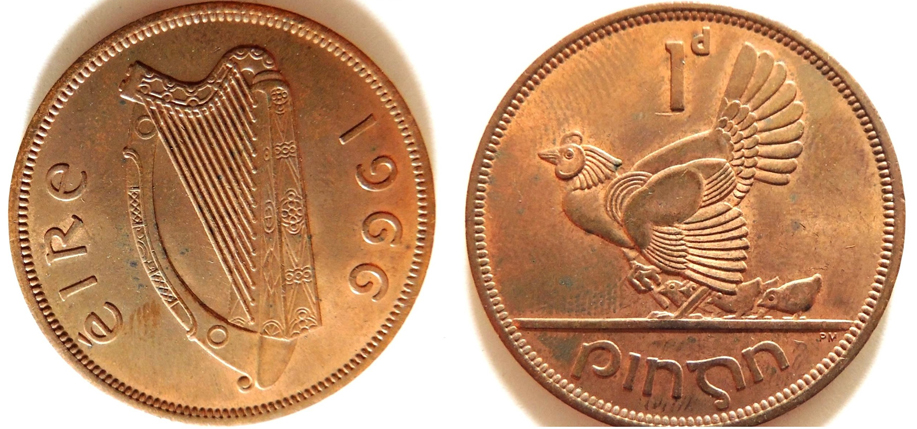Growing up in Ireland in the 1950s and ’60s was a thrifty existence. “Take care of the pennies and pounds will take care of themselves,” my mother would say, encouraging us kids to save. She opened Post Office accounts for us. You could deposit as little as sixpence and the clerk would diligently mark it down on your passbook. I can still see those checkmarks, through there weren’t so many in my book. Despite my mother’s entreaties, any coppers that came my way were soon spent.
Having a penny to spend was a magnificent thing back then. Unlike English coinage, with its kings and queens, our money had animals. A copper penny, much bigger than an American penny, bigger, even, than a quarter, had a hen with chicks (a half-penny had a sow with piglets).
A penny was something that you could hold on to. It fitted nicely in your fist, heavy enough that you knew the value of it. The copper would warm up in your hand as you walked about with it, clutched it in your pocket. Shame to let it go, really – would it be four aniseed balls, or two gobstoppers? Splurge it on a Penny Bar that would be gone in a minute, the toffee melting in your mouth, or make it last? Those gobstoppers were so big that one would last you a whole day if you resisted the temptation to sink your teeth into it when you had sucked it down in size.
Most often, Nell Kennedy’s shop at Ballycommon crossroads, down the road from school, was where we spent our coppers. Though you may have carefully considered and weighed the purchase options during school hours, there was still a psychological barrier to cross before you left the shop with your treat – the Black Baby Box.
You had to avert your eyes, close your mind to that box perched on the counter, and swallow your guilt about not saving a soul in Africa, that day at least, before you emerged back out into the sunlight. Some days you didn’t pass up the box, and there was reward in that, too. The warm glow of self-sacrifice would last almost as long as the gobstopper.
Even in the poorest of times, Ireland raised millions to support its priests doing missionary work in places like the Congo. As politically incorrect as the phrase, “a penny for the black babies” sounds today, the notion of helping others, drummed into our heads by teachers and nuns and visiting missionaries, was not a bad thing.
All this reflection about the Ireland of my childhood was brought on by my visit to Citigroup’s headquarters in lower Manhattan. The sight of the Global Equity floor that Dan Keegan oversees – hundreds of traders focused intently on multiple computer screens – was astounding. I found myself asking, “When did the Irish become so good with money?”
Scientists involved in unlocking the secrets of our genes are proving that memories are passed down through our DNA. Did the experience of forebears, of making do in hard times (“stretching a penny”), manifest itself in today’s good money managers?
Do those same historic memories also impact the ability to share the wealth? I think so.
Irish America magazine salutes the men and women of our Wall Street 50.
Their achievement in the world of finance is awesome. Their generosity in helping others is priceless.
Mórtas Cine. ♦


Hello Patricia:
Just read your piece re Irish Penny and it certainly brought back many memories of school in Waterford with the Convent of Mercy Nuns!!!
Just this past week I was explaining to some friends here in Litchfield CT
about the “pennies for the black babies” whilst they were astounded – well some, the Irish religious raised lots of money for the missions. However, I am also thinking of my poor mother raising 8 kids and having to come up with all those pennies! The gobstoppers won over many times!! or the h’alfpennie toffee squares!!
Very nicely written, Ms. Harty, despite the grammatical error at the end. The parts about your youth are lovely – sounds like you had a loving environment and I empathize with a fellow candy-lover. Your writing is much better than that of a lot of your current staff/contributors, and not so long-winded!
I did not know you grew up in Ireland. Same with a former police chief of San Francisco. Someone tipped me off he had gone “to Ring College, same as you.”
I called and talked to him. About Ring College, the chief said, “Oh, yes, they listened to you at night. If they heard you speaking English you were on the train home the next day.”
He built a beautiful home for his mother atop one of San Francisco’s most elegant hills.
I worked with a lot of African-American babies as a high school teacher. They gave me back more than I gave them. They called my class, “The Class of Creativity.”
Peter
Critical Pete
Oakland, California